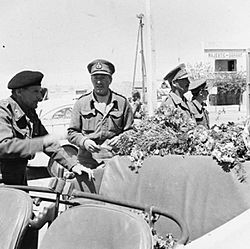Ian Erskine facts for kids
Quick facts for kids
Ian Erskine
|
|
|---|---|

Erskine (centre) with Bernard Montgomery (left) in Sfax
|
|
| Born | 17 March 1898 London, England |
| Died | 27 July 1973 (aged 75) Sandwich, Kent, England |
| Allegiance | United Kingdom |
| Service/ |
British Army |
| Years of service | 1917–1949 |
| Rank | Major General |
| Service number | 15319 |
| Unit | Scots Guards |
| Commands held | 22nd Guards Brigade (1941) 2nd Battalion, Scots Guards (1940) Tactical School Middle East (1940) |
| Battles/wars | First World War Arab revolt in Palestine Second World War |
| Awards | Companion of the Order of the Bath Commander of the Order of the British Empire Distinguished Service Order Mentioned in Despatches (2) |
Major General Ian David Erskine (born March 17, 1898 – died July 27, 1973) was an important officer in the British Army. He served in both the First World War and the Second World War.
Contents
Early Life and Education
Ian Erskine was born in London, England. His family had a history of important people. He went to Sandroyd School and Winchester College. After that, he studied at the Royal Military College, Sandhurst, which is a famous place where army officers are trained.
Military Career
Joining the Army
Ian Erskine joined the Scots Guards, a famous army regiment, on May 1, 1917. In August of that year, he was sent to the Western Front during the First World War. He was injured in October 1917. However, he returned to the front lines in October 1918.
Between the World Wars
After the First World War, Erskine continued his army career. From 1921 to 1923, he worked as an adjutant at the Guards Depot. An adjutant is an officer who helps with administrative tasks. He then served as the regimental adjutant for the Scots Guards until July 1932.
In September 1933, Erskine was promoted to major. From 1933 to 1935, he attended the Staff College, Camberley. This college trains officers for higher leadership roles.
Service in Palestine
Between 1935 and 1939, Erskine was a Brigade Major for the 1st Guards Brigade. During this time, he served with his brigade in the Arab revolt in Palestine. This was a conflict between Arabs and the British in the region.
Second World War and Later Service
As the Second World War began, Erskine took on more important roles. From 1939 to June 1940, he was an instructor and then the commandant of the Tactical School Middle East. After that, he became the commanding officer of the 2nd Battalion Scots Guards.
From February to October 1941, he commanded the 22nd Guards Brigade in Egypt. For his brave actions during this time, he was mentioned in official reports (called "Mentioned in Despatches") and received the Distinguished Service Order. This award is given for outstanding leadership in battle.
In 1942, he became a Major-General and was in charge of troops and commandant of the Sudan Defence Force. He was promoted to acting major general in April of that year. From 1943 to 1945, Erskine was a Brigade Commander for training establishments.
After the Second World War, from 1945 to 1948, Erskine served as the Provost Marshal of the Army at the War Office. This role involves military police duties. He retired from the army in May 1949 with the rank of Major General.
Awards and Recognition
For his long and distinguished service, Ian Erskine received several important awards:
- He was made a Commander of the Order of the British Empire (CBE) in 1947.
- He became a Companion of the Order of the Bath (CB) in 1949.
- He also received the Distinguished Service Order (DSO) and was Mentioned in Despatches twice.
Personal Life
Ian Erskine married Mariora Beatrice Evelyn Rochfort Alers-Hankey on March 1, 1945.
 | John T. Biggers |
 | Thomas Blackshear |
 | Mark Bradford |
 | Beverly Buchanan |

